Spectre of ethnic divisions hangs over Malaysia as racial, religious rhetoric intensifies ahead of state polls
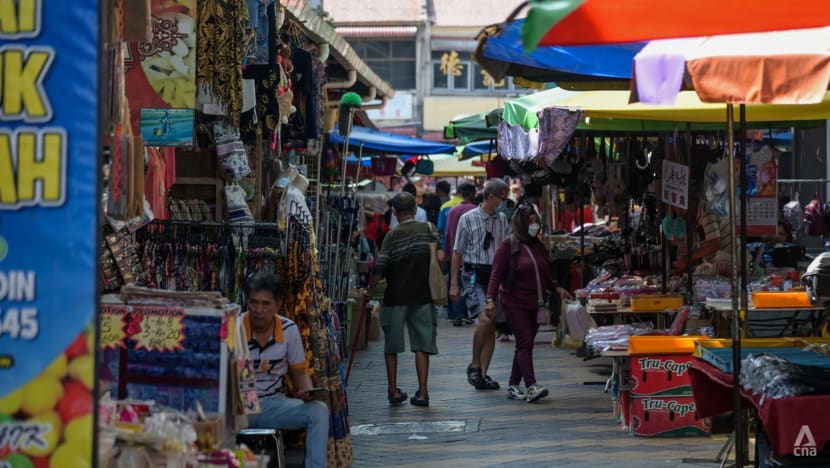
A busy market located in Georgetown, Penang. (Photo: CNA/Fadza Ishak)
PENANG/SELANGOR: Graduate student Karen Tan vividly recalls a time when she once idolised former Malaysian prime minister Mahathir Mohamad as a leader who espoused multiculturalism and fought for all races.
However, the 34-year-old Penang resident tells CNA she has recently become disenchanted with this notion, following a series of social media posts made by Dr Mahathir ahead of the Malaysia state election campaign.
For instance, Dr Mahathir, 98, wrote in a Facebook post: “Stop talking about Malaysia as a multi-racial country. It is not. It is a Malay country which hosts people from other countries.”
Ms Tan told CNA that such comments were “hurtful” to her and her family, who are ethnic Chinese and have been living in the country for three generations.
“So, all this while, we ethnic minorities have been living in Malaysia - the Chinese and Indians? This is our country too,” said Ms Tan.
“It’s scary that with elections coming up, some politicians are resorting to this kind of tactics to win support. I think it will only create divisions,” she added.
On Aug 12, voters in six Malaysian states of Kelantan, Terengganu, Kedah, Penang, Negeri Sembilan and Selangor will go to the polls to elect members of its state assemblies.
According to the Election Commission, more than 9.7 million people will be eligible to vote in these six states.
According to the 2020 National census, the Malaysian population is made up of 69.3 per cent of Bumiputera (Malays and other indigenous people), 22.9 per cent of Chinese, 6.4 per cent of Indians while 1.4 per cent are classified as others.
As the political parties gear up in campaigning, some politicians across both sides of the aisle are reportedly relying on racial and religious rhetoric to win votes.
However, some voters like Ms Tan, as well as political observers are concerned that if this continues, the country could become more divided and culture wars could erupt.
STOKING RACIAL AND RELIGIOUS SENTIMENTS
Both the unity government coalition of Pakatan Harapan - Barisan Nasional (PH-BN), and the opposition Perikatan Nasional (PN) have been on the offensive, and there have been cases of politicians from both camps reportedly stoking racial and religious sentiments to canvass votes ahead of the six state polls.
For instance, some unity government leaders are playing up the “Green Wave” phenomenon to warn ethnic minorities of a growing sentiment of islamisation in Malaysia while the PN opposition have campaigned heavily on Malay and Islamic values to warn voters against minorities taking control of the country.
Dr Mahathir, who is campaigning on behalf of PN for the state polls, has been vocal in stressing that Malaysia belonged only to the Malays.
The 98-year-old who lost his deposit when contesting the Langkawi parliamentary seat in the 15th general election last year, also wrote on his Facebook page that Malays should vote for PN so that the country would remain as 'Tanah Melayu' (land of the Malays).
During a political rally in a rural Malay village near Butterworth on Tuesday (Aug 1), PN politician Wan Saiful Wan Jan who is leading the coalition's campaigning efforts in mainland Penang, highlighted a recent controversy that made news headlines.
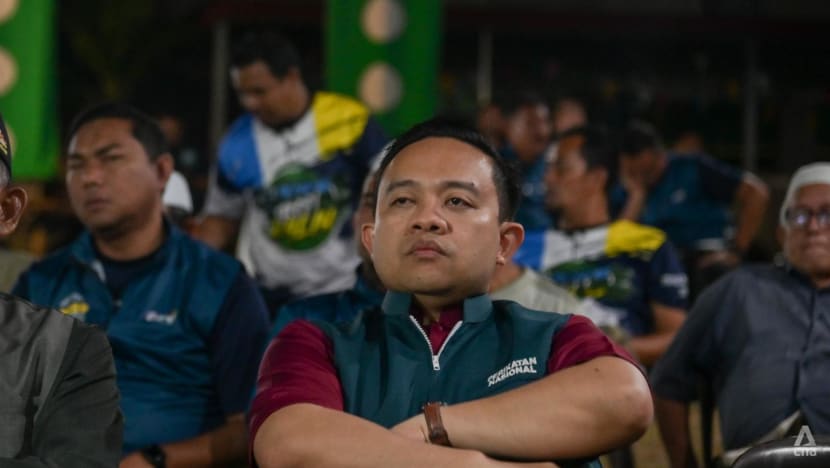
Mr Wan Saiful recalled how the Good Vibes music festival in Kuala Lumpur was cancelled in July after the frontman of a British pop group The 1975 kissed his male bandmate on stage and criticised the country’s anti-LGBT laws.
The festival was later halted by the government, but according to Mr Wan Saiful, the damage had already been done.
“It's not just the thousands who attended the festival that day who saw the kiss, but the video of them kissing has circulated on Facebook, TikTok and other social media platforms,” said Mr Wan Saiful, who is member of parliament for the Penang federal seat of Tasek Gelugor.
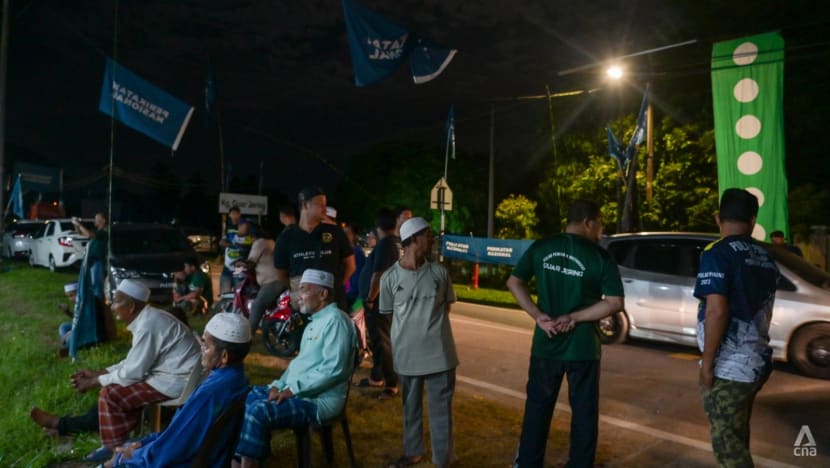
When asked by CNA after his speech if he was using religious rhetoric to persuade voters, Mr Wan Saiful maintains that what happened at the Good Vibes music festival is more a reflection of an incompetent government at the helm.
“Many of the voters are concerned about race and religion, you cannot deny that. But I think the most important factor is… about the competence of the people in power,” he said.
“A competent government does not exist in Malaysia today. If we take in comparison, I think what happened in Malaysia in the Good Vibes Festival concert recently, it will not happen in Singapore,” added Mr Wan Saiful, who was CEO of independent think tank Institute for Democracy and Economic Affairs (Ideas).
On the other hand, Democratic Action Party chairman Lim Guan Eng also made headlines last month when he was initially quoted as saying by local daily China Press and subsequently portal MalaysiaNow that PN intends to destroy Buddhist temples if elected.
MalaysiaNow also reported Mr Lim comparing such a scenario of PN winning in Penang to the invasion of the Mongols into the Chinese empire in the 13th century.
China Press later clarified that Mr Lim was actually referring to Hindu temples in Kedah. Local media reports have said that three Hindu temples were demolished during PN’s last five-year term helming the Kedah government.
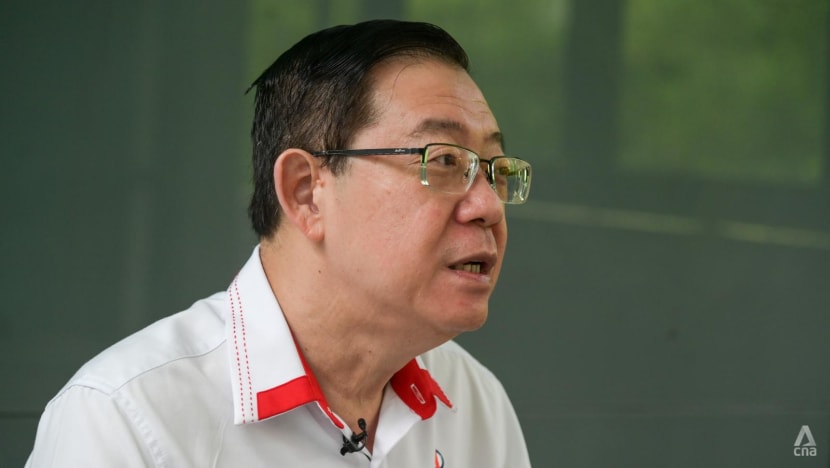
When asked by CNA to clarify these comments, Mr Lim maintains he was misquoted and that he was referring to Hindu temples and not Buddhist temples.
He added that the comparison made with the Mongol invasion of China is “a total lie” and is perpetuated by MalaysiaNow, which he claims is a pro-PN news outfit.
“I never talked about Mongol invasions. I think this is again part of their (PN) strategy to use lies repeatedly … That is how they misled the Malay community up until today,” Mr Lim told CNA.
“We have to of course continue to use facts but when you talk facts it is not as attractive as emotive speeches. So that is why we have to continue to rebut these false narratives. It is not going to be easy but I think we believe at the end of the day, there are enough educated voters who know what is right for the country,” he added.
Yet, Mr Lim and other DAP leaders have also stirred controversy by perpetuating PN's growing influence in the Malay Muslim heartland as the “Green Wave” - in reference to Parti Islam Malaysia's (PAS) perceived conservative Islamic policies.
In the same speech, he was quoted by China Press as saying that the “Green Wave” - as green is associated to PAS with its flag being in the colour - might result in Penang residents one day being prosecuted for wearing shorts in their own shops.
"We young people want to be healthy and maintain our physique, so when we want to exercise, we wear shorts. But the Green Wave says we can't wear shorts, even in our own shops. I see that, in the future, you'll also need to wear clothes when taking a shower,” he reportedly said.
Former DAP MP Ong Kian Ming wrote in a recent commentary that perpetuating the Green Wave plays into a larger Islamophobic narrative which is prevalent among some segments of the non-Malay community and abroad.
"This kind of sentiment is particularly unhelpful especially when it comes to understanding the different demands of the increasingly diverse Malay community in Malaysia," he wrote.
RACIAL POLITICS WILL POLARISE COUNTRY: ANALYSTS
In the lead up to the state polls, the Malaysia government announced that it will set up a “special unit” to deal with issues concerning race, religion and royalty - also known as 3R - issues that are played up ahead of the upcoming six state polls.
Communications and Digital Minister Fahmi Fadzil reportedly said that the special unit is focused on incidents which could cause disunity and social unrest.
"We have freedom of expression but we have no freedom to slander or pit the rakyat (citizens) against one another by resorting to 3R issues," he reportedly said.
The government is also mulling a new law to impose civil penalties on those who play up 3R.
The new law which may be called the State and Nation Act is like the Maintenance of Racial Harmony Act in Singapore but in the Malaysian context.
Currently, the Sedition Act is primarily used to investigate any purported offences involving these 3R issues.
Recently, caretaker Kedah chief minister Muhammad Sanusi Md Nor was charged with two counts of sedition for allegedly insulting Selangor ruler Sultan Sharafuddin Idris Shah.
A study by the Centre of Independent Journalism (CIJ) found that 15 per cent of 18,721 social media posts that they monitored from July 24-30 as part of a “Say No to Hate Speech” campaign in conjunction with the state elections indicated that racist, xenophobic, homophobic, transphobic comments and gender stereotypes continue to be normalised with no obvious counter-messaging from political leaders or the public.
The overall narratives of the posts centred on race, religion, gender, and targeting lesbian, Gay, Bisexual, Transgender and Queer (LGBTQ+), with 85 per cent of the posts consisting of general comments and non-offensive disagreements.
In this period of monitoring, Dr Mahathir emerged as one of the key proponents of inflammatory statements related to race, CIJ found.
CIJ also found the re-emergence of the ‘kafir harbi’ (infidel) narratives, some of which have been propagated by youths urging Muslims to vote with the warning that non-Muslims who are against Islam might take over the government.
Amid the intensifying hate speech, political observers CNA spoke to outlined that these initiatives by the government are important as racial and religious rhetoric could widen ethnic divisions across the country and result in unrest.
Nusantara Academy for Strategic Research senior fellow Dr Azmi Hassan said that the racial and religious polemics have been in the open for quite a while in the country and these sentiments are amplified during election campaigns.
“We saw this during the 15th general election and PAS has been using these issues to their advantage. In the rural Malay heartland, it has been very effective for them with people seeing the party as a pillar to protect Malay rights,” he said.
PAS - a key component in PN - won the most number of seats in the last General Elections, winning 49 of the 222 parliamentary seats.
Dr Azmi said that the misuse of these issues would ultimately be detrimental to society.
“During my school days, I didn’t see (my schoolmates as) Chinese or Indians but only friends. These days it is different and very polarised because of politicians who use this for their political gain,” he said.
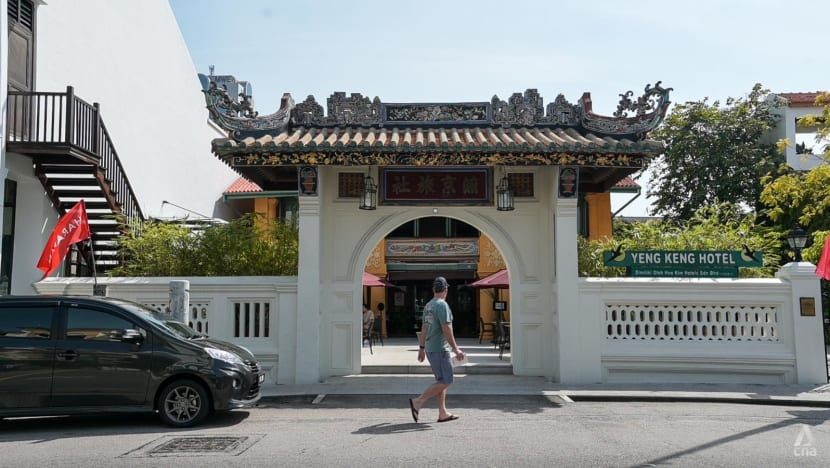
Dr Wong Chin Huat, political scientist from Sunway University, opined that PN shoulders more of the blame in stoking racial and religious sentiments.
He acknowledged that some DAP leaders like Mr Lim "oversimplify” PN and PAS’ surge from the religious angle and that this was counterproductive.
However, Dr Wong stressed that the party has mellowed in this regard. On the other hand, he maintained that PN harping on the 3Rs was “a given”.
“This is driven by two intertwining factors, one, the deep social divide on national identity and public policy, two, the incentive structure produced by the political system that prevents non-communal issues like class, environment, gender and generation. The former is a given but the latter is what drives the divide deeper after the end of BN's rule in 2018,” said Dr Wong.
He said that the two-coalition system, with PH-BN on one side and PN on the other naturally lends itself to situations where racial politics will be endemic.
“When one side can win without being inclusive, and the other side cannot win just by being multiethnic, then it is inevitable for the former to play up identity politics,” said Dr Wong.
“Polarisation will get worse if the toxic two-coalition rivalry (even just in the Peninsula) continues, which will see the shrinking of the multiethnic force and likely intra-Malay race in outdoing each other in narrow identity politics,” he added.
SOME POLITICIANS PLEDGE TO MOVE AWAY FROM 3Rs
In spite of the intensifying racial and religious rhetoric, there may be some light at the end of the tunnel.
Politicians who spoke to CNA maintain that banking on these sentiments are not part of their strategies.
DAP’s Mr Lim said: “The real issue for this election is still the economy, cost of living, whether we can assure the rakyat, people the prospect of a better life, of course, better opportunities in jobs and businesses and an assured digital future. But if you address these issues, if you do not talk about your competency and abilities to handle these issues and keep on relying on 3R, that is a final act of desperation.”
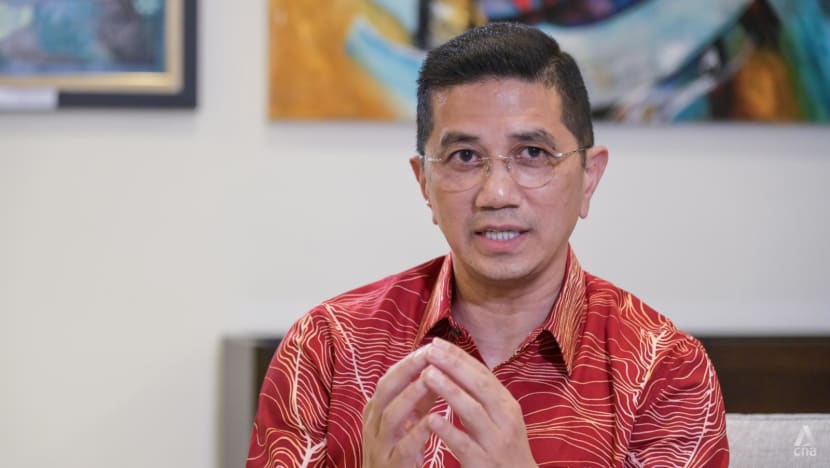
PN politician Mohamed Azmin Ali, who is the former Selangor chief minister, told CNA that PN is in its essence a multiracial and multireligious coalition that represents all Malaysians.
When asked about instances of PN leaders harping on racial and religious polemics, Mr Azmin, who is contesting the Hulu Kelang seat in Selangor against one of his ex-aides, claimed that these were isolated cases.
He said that PN is focusing instead on the “wave of discontent” among the people, and that the coalition had a strong track record when it governed during Prime Minister Muhyiddin Yassin’s tenure and helped the country with initiatives to cope with the COVID-19 pandemic.
“I think and I believe that voters are smarter and more mature, and can make their own assessment on what we have done before. Moving forward I believe they will support PN,” said Mr Azmin.
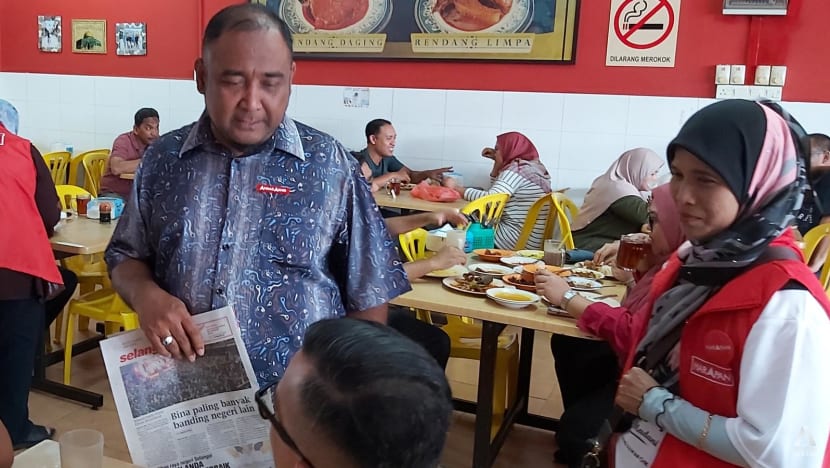
Meanwhile over at Selangor’s Taman Medan state constituency, PH candidate Ahmad Akhir told CNA that he is determined not to campaign along racial lines as he has seen with his own eyes the horrors of racial unrest.
Taman Medan is an urban seat with a racial composition of 67 per cent Malay, 15 per cent Chinese and 18 per cent Indian.
Mr Ahmad still recalls vividly the Kampung Medan in riots in 2001 that saw racial clashes between some Malays and Indians, which led to six deaths and many others being severely injured.
Mr Ahmad told CNA that he saw some of the corpses during the incident.
“I was involved directly because my house was in the area that was affected. I saw the tragedy with my own eyes. But as time has passed, there have been no problem among the races,” said the Parti Keadilan Rakyat member.
He told CNA that both he and his PN opponent have avoided stoking racial or religious sentiments during their campaign thus far.
“The main issues here centre around poverty and socio-economic issues. Some people don’t have food to eat. It is more important to highlight these issues, then play up sentiments about race and religion, he said.


















